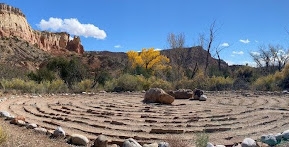Consulting with a Coaching Mindset

Published on August 23, 2022 by Greg Klimovitz
Teresa of Ávila is the kind of mystic that can make you both misty and mad. On one page she pens words to her beloved Carmelite “daughters” about their value and worth, leaving me in a meditative puddle:
“…this true Lover never leaves [the willful soul], but goes with it everywhere and gives it life and being.”
On the next page, the first woman honored as Doctor of the Church employs self-deprecating language as a reminder that even the most sacred of saints were products of their times laden with patriarchal language and debilitating religiosity.
I may have thrown the book across the room a time or two.
And yet, I am so glad, after each instance of literary rage, I pick the book off the floor and read more of Teresa’s pilgrimage through mystical mansions. As someone who values both capacious leadership coaching and organizational consulting, I cannot think of a more beautiful litany than what Teresa offered to those under her tender care:
“It is a great advantage for us to be able to consult someone who knows us, so that we may learn to know ourselves. And it is a great encouragement to see that things which we thought impossible are possible to others, and how easily these others do them. It makes us feel that we may emulate their flights and venture to fly ourselves, as the young birds do when their parents teach them; they are not yet ready for great flights but they gradually learn to imitate their parents. This is a great advantage, as I know.”
(Interior Castle, 49)
In a world ripe with absurdity related to our worth and potential, Teresa reminds us of the timeless call to hold space for others to see what they may not be able to see for themselves. This is the sacred work of both coach and consultant, two distinct disciplines with just enough in common to reinforce the parallel value of each. It is what unleashes a kind of coaching-based consulting.
What might this look like in real practice?
First, when we consult like a coach, we offer to our colleagues and clients, congregants and others entrusted to our care, a compassionate curiosity through questions of intrigue. We let the responses linger beyond angst and temptation for quick fixes. Lasley, Kellog, Michaels, and Brown write, “In practice, coaching is an empowering process where the coach asks rigorous questions and provides sacred space so people can discover their own creative solutions.” (Coaching for Transformation)
Ted Lasso said it even better when he (mis)quoted Walt Whitman, “Be curious, not judgmental.”
If we consult more like a coach, our incisive questions bear the fruit of informed, contextual, and relevant solutions co-designed and co-discovered with our clients. We leave room for more than what may initially feel obvious (or not) to us. We get to know the dreamer, designer, and laboring leader aspiring for lift off.
Second, when we consult like a coach, we thread connectional empathy that humanizes our clients and affirms right-sized capacity for beauty and possibility in even the most turbulent times. Brené Brown has said, “Empathy is the thread that connects us to other humans. When empathy is used in everyday life, it makes us feel more connected to one another. And when we feel connected to those around us, we turn into better, more compassionate people.”
When empathy is leveraged in coaching-based consulting, we become more compassionate and connected professional partners in the co-navigation through change. We nudge and empower our clients to take flight on their terms when everything around them demands they ground themselves in cynicism, despair, and trauma-induced idleness.
Finally, when we consult like a coach, we collaborate gradually and completely, recognizing that how we begin, move through, and exit our interactions is vital for the sustainable flourishing and flight of those we serve. “Coaches are fiercely committed to each person’s capability and magnificence,” writes Chris Holmes. “We believe that the people we are coaching already possess the deep inner wisdom needed to create options, make decisions, and devise outstanding plans, so our job becomes helping them excavate that gold by listening deeply, staying curious, exploring alternatives, and asking good questions” (The Art of Coaching Clergy).
This fierce commitment begins with setting client-centered goals, agile and actionable plans to achieve these goals, and intentional follow-up and evaluative scales to assure what they have learned about themselves and the organizations leads them to healthily navigate change and thrive in their contexts.
Compassionate curiosity.
Threaded empathy.
Gradual collaboration.
This is the work of coach and consultant. This is the “great advantage” and “great encouragement” Teresa of Ávila calls us to know and extend as young and old(er) birds.
Let’s take flight together.
Tags: Read our Blog